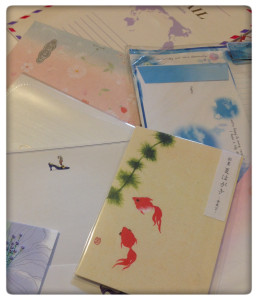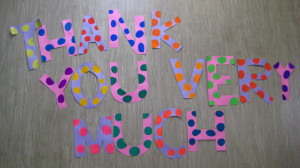As I was going through old blog entries, I found the following information tucked away. I had drafted it, intending to post it - yet time moved along and there it stayed.
Although I'm no longer living in Japan, I still find a lot of the quotes below useful, and decided to post this (3 years late). For those of you on the JET Program now, I hope that you will be able to find these notes useful.
-"Many Japanese people do not consider such questions overly personal. They do not expect precise answers, either."
-"'Secretaries' in Japan are different from those in the United States. More like executive administrative assistants, they have fairly responsible and well-paying jobs in large companies. The term 'secretary' is a mistranslation."
-"Bob made an excuse and failed to apologize. Apologies are very important in Japan."
-"Jeff should not have written on the meishi or put them in his back pocket."
-"Because they were drinking alcoholic beverages, Leo should have held his glass when someone else poured for him, and he should have poured the other person's drink in return. Pouring your own drink is not appropriate in such social drinking sessions, either."
-"This is a way of being humble. The Japanese use the word tsumaranai to let the recipient know that the giver is not conceited about the gift; hitotsu does not indicate the number of items in the box but simply means "just a little bit."
-"In Japan, one is expected to apologize and visit the victim of an accident, even if one is not at fault, to show his or her sincerity. In fact, one is expected to apologize whenever the other party involved suffers in any way, materially or emotionally."
-"When Japanese people ask 'Dochira e?' they are not expecting to hear where you are going. They are simply acknowledging your presence, and sometimes they tell you that you look very nice (therefore, you must be going somewhere) by this greeting phrase. It is similar to "How are you?" in English in that it does not expect an explanation. The most appropriate reply to 'Dochira e?' is 'Chotto soko made' ('Just down the way.')"
-"It is Japanese custom to remove one's coat before entering someone else's home, even if just for a minute. Removing one's coat does not imply that the guest intends to stay."
-"Although company staff meetings in Japan can include lively discussion, group involvement in projects typically requires lots of consensus-building before formal decisions are made. One is expected to figure out that a "pointless question" or silence means reservations or disagreement. Sometimes a lone dissenter is ignored because he or she has not made the effort to get constructive criticism from workmates before formal statements are made; group approval is often secured by more informal maneuvering prior to the meeting. This process is called nemawashi, and important skill in Japanese society."
-"Traditional art lessons in Japan often take the form described here. The teacher shows an example, and the students follow the example. Students are to copy the teacher until they master fundamental forms and methods. Individuality and creativity are supposed to come only after one has mastered the basics."
-"In Japan, seeing people off is almost a ritual. You are expected to wait until the guests (or whomever you're seeing off) are out of sight; while you wait, you either wave good-bye or bow."
-"When someone you know has lost a close relative, you say the folowing set phrase in a low and unclear voice; 'Kono tabi wa doomo goshuushoo sama deshita' ('My condolences to you for your recent loss')."
-"_te kudasaimasen ka? _te itadakemasenka?"
-"...they do give gifts twice a year (once in August and once in December), called ochuugen and oseibo respectively, to those who have been helpful to them during the year such as teachers, superiors, and doctor. Gift items selected are often rather practical items, like food staples, seasoning, or soap. Those gifts are seldom opened in front of the giver, but are opened after they leave... personal gifts, such as Christmas gifts and birthday gifts, ...are opened immediately."
-"The sound of the kanji character for "death" has the same sound as the character for 'four.' The Japanese avoid giving four of anything."
-"shinnen omedetoo or akemashite omedetoo"
-"The expression... gokuroosama deshita, is usually used by a superior to an inferior when the former thanks the latter (normally when the inferior has done what was expected)."
-"You can tell such bouquets apart from others because they are made to be seen only from one angle (shaped flat) and they always have green, hard leaves in the back. If you see a lotus bud or pod, you can almost always be assured that the bouquet is for a Buddhist altar."
- Expect to pay cash as a wedding gift. Do not give 400 yen as a sum. Make it 300 or 500.
- L






